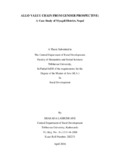Please use this identifier to cite or link to this item:
https://elibrary.tucl.edu.np/handle/123456789/2166| Title: | Allo Value Chain from Gender Prospective |
| Other Titles: | A Case Study of Myagdi District, Nepal |
| Authors: | LAMICHHANE, SHARADA |
| Keywords: | Plants;Gender |
| Issue Date: | Apr-2016 |
| Publisher: | Central Department of Rural Development Tribhuvan Univeristy, Kathmandu |
| Abstract: | Gender responsive and socially inclusive value chain development is progressively realized for sustainable economic growth of Nepal. The thesis is designed to analyze the social dimension and gender perspective in relation to value chain analysis and development of Allo subsector in Myagdi district. Using qualitative research approach, the thesis presented Allo Value chain from gender prospective and analyzed the social dimension and gender perspective in relation to value chain of Allo subsector in Myagdi district. The study had two major objectives. The first one was to prepare gender sensitive value chain map of Allo. Secondly it aimed to conduct gender analysis with respects to division of labor, access and control over resources and benefits, level of participation in decision making, power relations and empowerment level in Allo value chain. Qualitative research tools, such as two Focus Group Discussions, 23 semi structure interviews, 15 Key Informant Interviews and field observation were carried out during May 2015 to June 2015 to collect primary data. Secondary data also collected from relevant sources. Data were analyzed using Miles and Huberman framework's to analyze qualitative data. The research finding shows that indigenous women are the main actors of the Allo value chain in Myagdi. Out of all actors, nearly 93 percent are women, 72 percent Janjati and 20 percent are Dalit. About 95 percent of the actors belong to Disadvantage Group (DAG). Women disadvantage people's involvement is significantly higher in lower level of the value chain such as harvesting, primary processing, Yarn producing and weaving whereas men's involvement significantly high in trading (village level as well as in district level trading). Out of all traders women's proportion is 43 percent in village level and 38 percent district in district level. The lower level of value addition is tedious, labor intensive, consume lots of time. Therefore, there is no incentive for well off people to get involved. It is found that disadvantage groups have few other opportunities to make cash income, the women and disadvantage group devote their time in Allo processing. The commercial production of Allo product is virtually exists in Myagdi district. There is no controlled over resources by certain group of people. The resource is jointly control by the all users of Community Forest User Group. The research found vii that money flow is not equally distributed among actors and is not based on how much of cost is adding to develop the product. Lack of market information, low bargaining power and access to finance prevents women getting into trading business. It is found that decision regarding Allo plant collection is made by the male and female jointly in informal meeting. Social as well as economic empowerment has been observed in women and disadvantage group due to economic benefit of locally available resources, technical skill training, interlinked with the marketing channel. The main weaknesses in the value chain are poorly organized collection and the rudimentary methods of fiber extraction, and spinning which leads to low quality of yarn. Similarly, there is lack of product diversification, and variety in terms of designs. The study comes up with few recommendations. The critical factor seems the need to upgrade the quality of processed fiber and yarn using improved methods and equipment. Integrating women producers into the supply chain of the members of fair trade would benefit from their extensive experience on new product development, and export of handicraft items to the overseas markets. |
| URI: | http://elibrary.tucl.edu.np/handle/123456789/2166 |
| Appears in Collections: | Rural Development |
Items in DSpace are protected by copyright, with all rights reserved, unless otherwise indicated.

